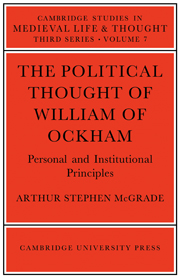Book contents
- Frontmatter
- Contents
- Preface
- Abbreviations
- 1 OCKHAM AS A POLITICAL THINKER
- 2 THE PROBLEM OF RADICAL ACTION
- 3 THEORY OF INSTITUTIONS: SECULAR AND SPIRITUAL GOVERNMENT
- 4 POLITICS AND PHILOSOPHY: NATURAL RIGHT AND THE ETHICAL BASIS FOR OCKHAM'S POLITICAL IDEAS
- 5 POLITICS AND THEOLOGY: SECULAR POLITICS AND CHRISTIAN VIRTUE
- CONCLUSION: OCKHAM AS A CONSTRUCTIVE POLITICAL THINKER
- Bibliography
- Index of passages in Ockham quoted, discussed, or cited
- Index of names
- Subject index
3 - THEORY OF INSTITUTIONS: SECULAR AND SPIRITUAL GOVERNMENT
Published online by Cambridge University Press: 16 October 2009
- Frontmatter
- Contents
- Preface
- Abbreviations
- 1 OCKHAM AS A POLITICAL THINKER
- 2 THE PROBLEM OF RADICAL ACTION
- 3 THEORY OF INSTITUTIONS: SECULAR AND SPIRITUAL GOVERNMENT
- 4 POLITICS AND PHILOSOPHY: NATURAL RIGHT AND THE ETHICAL BASIS FOR OCKHAM'S POLITICAL IDEAS
- 5 POLITICS AND THEOLOGY: SECULAR POLITICS AND CHRISTIAN VIRTUE
- CONCLUSION: OCKHAM AS A CONSTRUCTIVE POLITICAL THINKER
- Bibliography
- Index of passages in Ockham quoted, discussed, or cited
- Index of names
- Subject index
Summary
Ideo negatur illa: ‘Nulla communitas potest esse optime ordinata nisi uni supreme iudici sit subiecta’ … quia in tali communitate posset iste supremus iudex iustitiam in ruinam et etiam in perniciem totius communitatis delinquere, quod optimae ordinationi communitatis cuiuscunque repugnat.
Hence, that [proposition] is denied: ‘No community can be best ordered unless it is subject to one supreme judge … because in such a community that supreme judge could destroy justice by his wrongdoing and even endanger the whole community, which is repugnant to the best ordering of any community whatever.’
Octo Quaestiones III, 3; OP 1, 104f.Ockham's initial project of exposing and removing John XXII raised important questions in spite of itself. For although the goal was a change of persons rather than offices, this could be achieved only if offices and official responsibilities were regarded in a more flexible way than Ockham's contemporaries found tolerable. Hence, while he did not abandon his attack on the Avignonese popes, Ockham devoted more attention after 1337 to the papal office than to its occupants. Similarly, although he defended particular actions of Ludwig of Bavaria and his allies in this period, Ockham's main writings on secular politics were also pitched at a more general, institutional level. Following Ockham's own order of thought, then, we must go on to consider the basis, functions and proper relations of supreme spiritual and secular power.
- Type
- Chapter
- Information
- The Political Thought of William Ockham , pp. 78 - 172Publisher: Cambridge University PressPrint publication year: 1974

